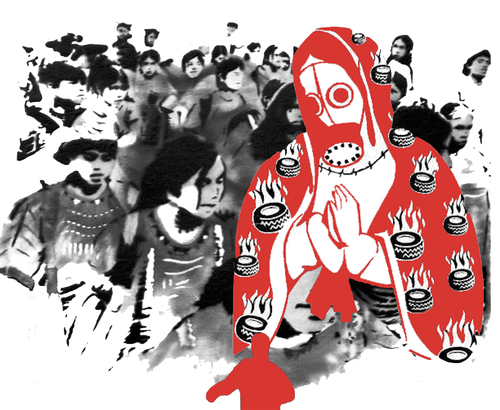 In January 2006, a group of women in Oaxaca, Mexico took over television and radio stations in support of striking teachers who were being brutalized by state police and paramilitary groups. And now UO faculty and graduate students have developed a website called “Making Rights a Reality,” which gives a direct voice to those who participated in and observed this protest.
In January 2006, a group of women in Oaxaca, Mexico took over television and radio stations in support of striking teachers who were being brutalized by state police and paramilitary groups. And now UO faculty and graduate students have developed a website called “Making Rights a Reality,” which gives a direct voice to those who participated in and observed this protest.
“The heart of this website is a set of interlinked testimonials from teachers and others who were illegally detained, tortured and imprisoned for their political activities as well as testimonials from their family members,” said Lynn Stephen, Distinguished Professor of Anthropology and Ethnic Studies and Director for the UO Center for Latino/a and Latin American Studies.
Women who participated in the takeover and reprogramming of the state’s public television and radio stations recorded testimonials as well. Indigenous Mixtec and Zapotec participants in the movement also provided testimonials for the project.
“The testimonials are urgent oral accounts of bearing witness to wrongs committed against the speakers,” she said, “as well as descriptions and analysis of events of the social movement.”
According to Stephen, the website was conceived of as a form of “digital ethnography” that lets viewers hear the voices of those who participated in and observed the Oaxaca social movement of 2006. Ethnography is a form of documentation that strives to produce understanding through richness, texture and detail from the perspectives of local actors who directly experienced and witnessed events.
In addition to 35 video testimonials and dozens of photographs, the website includes information about the histories of different social movements in Oaxaca during the past three decades and a video timeline of key events of 2006.
“The flexibility of digital media permits viewers to experience the interconnectedness of the different dimensions of the Oaxaca movement,” said Stephen. “It also highlights the links between individual experiences through testimony within the larger political, economic and cultural context.”
Visit www.mraroaxaca.uoregon.edu for more information.
– Lisa Raleigh


 Watch Ian McNeely's talk at Google, Inc. and read a chapter from his book, Reinventing Knowledge.
Watch Ian McNeely's talk at Google, Inc. and read a chapter from his book, Reinventing Knowledge.